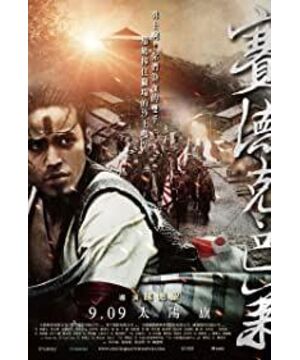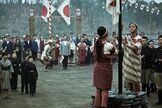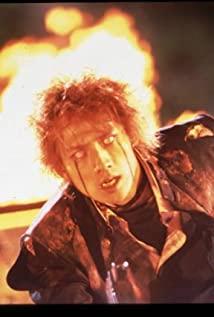The plot began in 1895, a year when the fortunes of many Taiwanese changed drastically, but for the 15-year-old Mona Ludo, life seemed no different. That year Mona Ludo made the grass for the first time. The movie showed his sexy body and vigorous skill. The first level of the two aborigines made him a "Sedek Bale" --- a real person. It’s very interesting that the ethnic names of many aborigines in Taiwan mean “people” in the local language, such as “Atayal” for Atayal, Bunun for Bunun, “Zou” for Tsou, and Rukai. The "Rukai" of "Saidk" of course also includes the "Sedek" of the Sediq tribe to which Monaludao belongs. In the language of this tribe, these all mean "people". Aboriginal people call their own people this way, but they don't necessarily call outsiders that way. They are often scattered into small settlements of about a hundred people, and the same "people" often kill each other for various reasons. Most of these aborigines lived in deep mountains and old forests, and the Qing court called them "shengfan". Compared with the population of Taiwan at that time, their number is not very much. Most of the aborigines have been assimilated by the Han nationality in the long history of Taiwan’s Qing Dynasty. Even the aborigines living in high mountains have been deeply influenced by the outside world under the policy of "opening the mountains and restoring them" by Shen Baozhen, Liu Mingchuan and others. However, as far as Monaludo and his Sediq tribe at the time were concerned, their lives were relatively isolated from the rest of the world. But this situation will soon be broken.
The movie roughly follows the historical plot. In 1895, the Qing court ceded Taiwan and Japan. In January 1897, a team of 14 people led by Japanese Captain Deep Diggers was killed by aboriginals in the area of Wushe. The Japanese side imposed a five-year "livelihood blockade" on the indigenous people in the area, making it difficult to obtain the salt and matches they needed. By 1902, the resistance of the flat Han people had been beaten down one after another, and the Japanese began to try to exert pressure on the aboriginal people in the mountainous areas. When the Japanese police wanted to forcibly enter the aboriginal territory, conflicts broke out with the aboriginals, which was called the "Ren Zhiguan Incident." Probably more than 100 Japanese soldiers against more than 200 aboriginal fighters. The aboriginals used favorable terrain to finally force the Japanese army back. 3 people were missing and 16 people were injured on the Japanese side. The Japanese side estimated that more than 20 indigenous people were killed or injured (1). These histories are reflected in the movie, so we saw the poor captain and his party watch the cherry blossoms at night, and again during the day. In the future, there will be countless people who will watch the cherry blossoms endlessly before they die. It makes me sigh: Now that people have nothing to admire the cherry blossoms, don't you know if you see too many cherry blossoms, you will die? Then we can see that the aboriginal Kai Wushuang beat the Japanese army to the ground. Of course, compared to the plot of the next episode, this is just a little insignificant. In fact, although the indigenous people live bravely, sturdy and mobile, and are familiar with jungle operations and are good at using terrain, their resistance is very fragile in the face of modern armed forces of the country. In addition, the Machpo Society where Mona Ludao is located is far away from the people's pass, and did not participate in the war at that time.
The tribal organizations of the aboriginal people are vulnerable to confrontation with the state apparatus. The aborigines are often scattered into small tribes with about a hundred people. Each tribe has its own leader. Several relatively close tribes form communities, which are similar to small alliances. There is a lack of unified leadership between tribes and communities, and the beliefs and traditions of the aborigines have left many contradictions and rifts between the tribes. Therefore, in the second year, the Japanese cooperated with the Bunun Ganzhuwan Society, and took advantage of the blocked aboriginal people's eagerness to seek trades, trapping and killing a large number of the Saidiq descent from the Wushe community in one fell swoop, which was called the "Ganzhuwan Incident." The Saidiq people in Wushe suffered heavy losses, so in 1906, the aborigines of Wushe handed over their weapons to Japan and surrendered. After that, the Japanese actively expanded the "Aiyong Line" composed of iron wire and wooden wall guards to the aboriginal areas, and used the contradictions between the tribes to "use the barbarian to control the barbarian." The Machpo Society, headed by Monaru Dao, was also used by the Japanese to attack other tribes. The Seediq also tried to resist Japan's expansion of the "Aiyong Line", which led to the "surprise attack on the brains and liao" of the aboriginal people. As a result, the tribes of the aboriginal people succumbed to and disarmed under the force of the Japanese. By 1913, all the tribes of the aboriginal people in Wushe had completely succumbed. Out of its policy of nostalgia for the aborigines, Japan sent Mona Ludo and others to Japan for a visit in 1911. This trip really made Mona Ludo a profound influence. Therefore, when his leadership rebelled against Japan in the future, he felt a sense of tragic "knowingly incapable of doing it" from the very beginning.
After 1913, the history of the development of Wusha, which the Japanese used to be proud of, seems to have been eliminated from all the factors that hindered Japan from exerting influence. Various modern facilities have been established. On the surface, the Kaiwushe area is already very prosperous, but in fact contradictions are already surging underneath. Japan’s rule in Taiwan is almost entirely dependent on the police, but the mountain police stationed in the aboriginal areas often feel that they are dispatched. Their quality is not high, and they often bully the aborigines. The Japanese feel the superiority of civilization. They both disdain to understand aboriginal society deeply, and lack respect for their customs and traditions. They only want to change their customs. However, in the eyes of Japan with a profound sense of hierarchical ethnic groups, even the indigenous people with a high degree of harmony are difficult to gain recognition. The "harmony" mainly consists of Japanese men and indigenous women, and the result is that the indigenous women are often abandoned in the future. Economic squeeze and discrimination are even more commonplace, and there are significant differences between groups from public office to labor treatment. In addition to the continuous expropriation of indigenous people’s residences in Wushe area, the wages are only half of that of the indigenous labors of the same kind. This is not a case of wage deductions. Although the Japanese side allowed the indigenous tribes to yield, they did not disintegrate the tribal organizations and the soil for their existence.
In fact, these issues are worthy of the Chinese people's thinking now: Has our own ethnic minority policy caused similar situations to happen? For example, as far as I know, Han students in Tibetan areas often attend classes in the school's Han class. They neither speak Tibetan nor have the motivation and need to learn Tibetan, and they have relatively little contact with local children. In Tibetan areas, it is almost common for Han people to speak and read Tibetan. There is also a certain degree of estrangement in the Han-Tibetan community. In order to protect the grasslands, the government banned herders from grazing while simply giving cash compensation. After entering the city, the herders only spent all the money on wine and meat, and then fell into poverty and couldn't help themselves. Relying on their economic advantages, as well as the convenience of cultural and personal connections, the Han and Hui ethnic groups can easily control commerce and trade in Tibetan areas. However, the monastery organizations in Tibetan areas still possess independence and strong organizational power.
To sum up, the factors that lead to similar ethnic conflicts are nothing more than economic oppression, as well as cultural barriers and discrimination. Vulnerable groups find themselves quickly marginalized in the process of modernization. They cannot see the future position of their group, so they would rather pick up traditional weapons to disrupt the existing order. Many things may not be intentional by the government, but if you let it go and do not intervene, it will only allow the contradiction to worsen and cause uncontrollable conflicts.
The part of the first episode of the film from 1930 is basically a reflection of historical facts. Its completeness even surpasses any single information in my hand. Almost all the proximate causes of the Wushe incident are reflected in the film, and I have to admire the serious and sincere attitude of the crew. Characters related to the Wushe incident also appeared one by one. Perhaps because of the large number of characters, Director Wei failed to show the relationship clearly and completely to the audience. So after I watched the entire movie, I had to find out the character relationship diagram on the Internet to finally figure out "who is who owns", and what I watched was the 4.5-hour full version. As for the friends who watch the cut version of the mainland, I can only express despair. In the performance of the characters, some places that should have been emphasized are understated, but the places that should have been cut are left. For example, like the first son of Hanagang Jiro's wife (Xu Ruoxuan), Director Wei gave her almost nothing in the plot before the "Wushe Incident". The mysterious life of her wife Jiro Hanaoka + daughter of the tower leader will not be fully revealed until the end of the first episode. And the earlier scene of the Japanese woman complaining that the aboriginal maids can’t work (it looks like Kojima’s wife played by Chie Tanaka, but she doesn’t feel like it, her identity is a mystery), but it’s actually very cumbersome and a very isolated plot. Of course, compared with the various ridiculous people in the next episode, these are not even problems.
For a detailed introduction to the Wushe incident , please refer to: http://knowledge.teldap.tw/focus/001005/ws1.htm
(1). For the "Ren Zhiguan Incident", please refer to: http://tw.myblog.yahoo .com/jw!uduCo2SGHRYWIzLEAu0T/article?mid=1213
View more about Sai de ke · ba lai: Tai yang qi reviews











